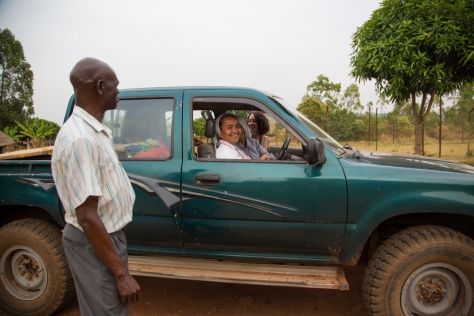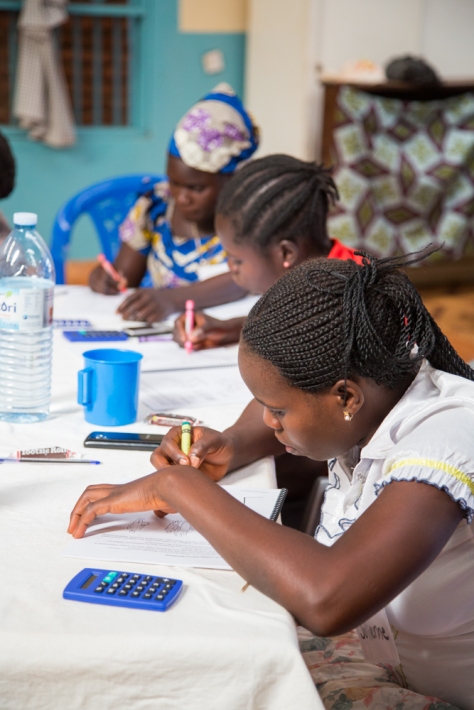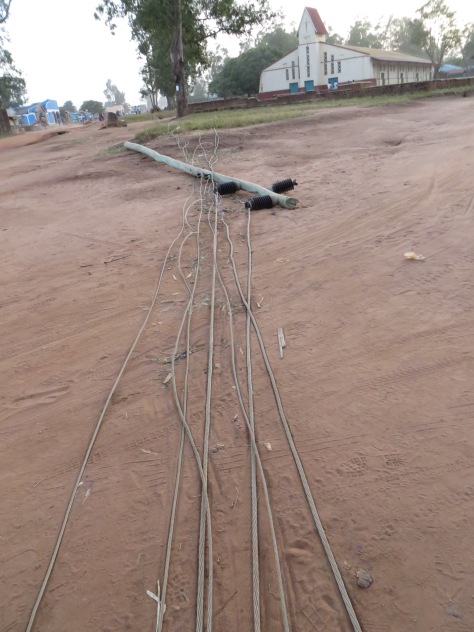My oh my, so much to say, and it’s just been a measly 10 days!
So far, Africa has felt far easier than I anticipated. I don’t plan on that being the case the rest of my time here, but I’m feeling a little spoiled as I sit on my queen size (seriously) foam mattress in the cute little “hotel” not far from Lake Victoria, with a hot water shower and flushing toilet just steps away. Don’t worry, it won’t be long before I finally use a “squatty potty” and have to take my bug spray and mosquito net a little more seriously. But, those days will come, for now you need to hear a little bit about the Congo trip.
Let me be honest, I knew very little about the DRC when I went. In fact, before I got my vaccines for this trip, I didn’t even know there was a Congo, AND a Democratic Republic of Congo. We went to the latter. I still call regularly call it Congo because Democratic Republic of Congo is really long, and most people have no idea what “The DRC” means. I also didn’t know they spoke French (did you know you only say ‘Bonjour’ the first time you see someone? And then the next time you see them it’s ‘Bonsoir’? I didn’t.) So, along with most of this trip, I brought very few expectations, and I am in a constant state of observing, listening, and learning.
This section of the trip started with a tiny little flight from Entebbe to Arua, Uganda. This flight wins for the smallest planes I’ve ever flown in: Propeller plane with less than 20 seats and a cockpit that isn’t separate. But you have to admit, there is something that feels extra cool about walking on the tarmac to your tiny airplane. Even when the tarmac is gravel like it was in Arua.




After arriving at the airport, the only information we had was “the sisters will pick you up and help you cross the border to Congo” (Arua, Uganda to Aru, Congo). Were we looking for Congolese nuns? The sisters of our American contact? Eventually, we had our answer: 2 Filipino nuns working in 2 separate Canossian missions in Aru, drove up in this truck. Meet Norie and Joy, full of life and love and hilarious energy, these pint sized sisters put our stuff in the back of the truck and dropped us off at a Hotel in Arua for a nap while they picked up some things in town.


These beautiful girls brought a new challenge for us. Of course, every group is a new challenge, but these ladies were all educated through high school, and all already were a part of the business. We did some adjusting to the language of the curriculum to fit their format of a cooperative, which of course leads to on the fly adjustments and unplanned lessons, which can be hit or miss. And when you have a finite amount of available time (not to mention people arriving on “Africa time” meaning at least a half hour late) things can start to feel challenging.

As is always expected with our trainings, the first few days everyone is fairly shy and quiet. Not only are we new people speaking a foreign language teaching pretty new and often hard to understand topics, but the format for the learning is completely new and probably uncomfortable for most of them. They have been learning their whole lives with repetition and “this is what to do and how to do it” in a lecture format. We set up our trainings with some lecture, but significant small group discussion, asking their opinion, and also skits, role play, even coloring and games. The looks you get when you first hand out crayons for them to draw out goals in their workbooks is laughable. You want me to draw like a little kid? Why aren’t you telling me exactly what I’m supposed to draw? By day 4, you have to take the crayons away because they are doodling in their workbooks instead of listening.
We value coloring and games and skits in the curriculum because not only does it help keep their brains awake on long hot days, but it encourages creativity and thinking for yourself. They aren’t just repeating what’s on the board or checking things off a list, they are thinking for themselves and thinking about their own opinion. Not only that, but games and skits really draw people out of their shells, making them more accepting of new ideas, and really bond with eachother. In any group this is great because they build relationships to help with accountability brainstorming after we’re gone, but especially with this cooperative they have grown together even more.





It sure isn’t all fun and games though. There are many parts that feel like slogging. With the help of translators doing some additional clarifying teaching, and multiple real life examples, we make headway. These ladies are all literate and have used calculators, which was a great start, but we still needed to go through the very basics of WHY and HOW to build budgets and savings for you business and personal lives.



One of our translators, Papa Jerome, is 65 and has been in this community since “the Belgians” (the wars for independence in the 60s) and had wonderful insight into the systemic problems. Since independence, the government looked out for itself and not its country. It pockets a vast majority of aid, and leaves the people in the lurch. People cannot trust the government to take care of them or assist them, so why make plans for the future? While not as volatile as it has been in the past, the lack of stability and lack of jobs means no understanding of looking to the future.

One of the sections I personally taught was Business Savings. I have heard the stories of how these lessons get hard, it feels like no one gets it, but pays off in the end. Since all the women were involved in the same cooperative, we decided to start a sample business savings plan for Totonga Bomoi. I assumed the hard part was getting to the numbers of the amounts and how much to save monthly. That wasn’t easy either, but the real sticker was the idea of WHY. When asking the question “what if your sewing machine breaks and has to be replaced?” the answer was “It hasn’t.” “What if” isn’t really a concept they are used to.


After that lesson, with attempt after attempt of explaining the idea of savings, I was pretty discouraged. How could I have taught it better and helped them get a better grasp? How do I, as someone who has never had to worry about putting food in my belly, explain to people who have seen or are currently in some very lean times, that setting money aside for later is a good thing? At the end of the section we got to a point where they had some understanding of how savings can be beneficial, and some basics of how to start a plan, but I wasn’t sure if they’d really taken it in or if they were convinced about it’s value.
But, when we did surveys at the end of the course, I heard over and over how they learned how important savings was and how it can help them be prepared for unexpected things in the future. Some girls had already talked with their families about the idea! Katie plans to have the cooperative sit down and make a solid savings plan for themselves.


It is also important to mention that while we offer a non-religious course, we most often use our this faith-based course. There is no requirement to be a Christian to use or partake in the course. There is no mandatory acceptance of Jesus or alter calls at the end of the course. Our purpose is to empower men and women to end or reduce financial poverty in their own lives in a way that is sustainable and community wide. While our motivation is our faith, we firmly believe that God loves everyone, and everyone deserves a chance at a better life regardless of your faith (and that you don’t have to believe in God to want that for others).
The faith based curriculum includes at least 1 verse in almost every lesson. These typically cover topics of your identity as God’s creation, your ability to do great things, basic ethics, and even savings and planning (Proverbs is full of great financial advice!) Whenever a verse was read was when I saw the most people shuffling in their workbooks. They wanted to make sure the references were listed. In some areas religion can be a hinderance, but in many of the places we’ve been in Africa we’ve seen it to be a benefit to the course. They are encouraged and the training has more validity because its teaching is backed by scripture!
After 4.5 days of training and hard work, they earn themselves a graduation ceremony. This is a fun and celebratory way to make them feel accomplished (because they are), and they get a signed certificate proving they went through the entire course.


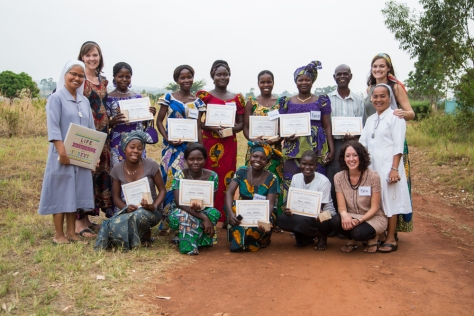

These women truly are beautiful inside and out, and how the potential to be game changers in their community and country. Their vibrancy and eagerness is infectious and I so look forward to hearing updates about their progress!
I wanted to share a few other notes and thoughts about the DRC.

One main realization I wanted to share: Religious institutions have gained a bad wrap when it comes to charity. This isn’t always incorrectly placed blame, but I can say with decent confidence Aru would be a far more terrifying place without the presence of the Catholic (and Anglican) churches. They have brought thriving schools (the first in the region years ago), clinics, hospitals, and empowering aid when their government has failed them. Since their start in Aru, the Canossian sisters haven’t given money away to the local poor. If someone has a need, they find a way for them to work for the ministry and earn wages. A pregnant woman sold bread to pay for her c-section, a boy washes dishes over break to pay for his school fees. We walked past many people every day to get to the library to do training, and only had 1 kid ask for “biscuits” (cookies), but no one asked for a handout! This is such a great way to aid with dignity! You could argue that the area has become dependent on the churches for things like schools and clinics, but when your government is not available to provide the basics, I am proud of and so impressed with the churches for stepping up.
Also, they are constantly looking for ways to benefit the community that is also income generating to help fund the mission. Brilliant little ladies.

Speaking of the government: I mentioned above the corruption in crossing the boarder. Another thing to notice, the roads aren’t paved at all. The drive from Arua, Uganda is paved quite nicely all the way until the border. Once you get on the other side with your visa, no more pavement. When Sarah asked Katie about what happens when people try and rise up for change, Katie said “They die.” She told us about a close friend of hers in another city who’s best friend poisoned for wanting to run for office for the opposition. Her friend himself also almost died second hand. Not to mention, multiple sets of power lines fell while we were there. Katie told us they’d probably get fixed around the next election, but until then not to plan on it. When we were returning home (on the paved roads in Uganda) we saw multiple power line poles being fixed/setup by teams of Ugandans.
Animals: I didn’t see much of any real wildlife, but goats and chickens roam all over, and the sisters have claimed multiple pet dogs and cats for their various buildings.


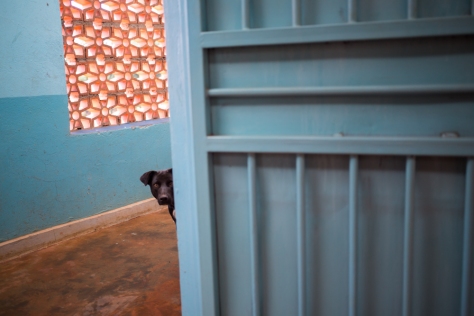
The beautiful congolese kiddos. I don’t know what more to say, I just have to share photos.





Relaxation: Thankfully we always had at least a little downtime in the evenings. Sometimes meals with someone else, but often just the 3 of us, and often in the dark. (When your town doesn’t have it’s own power, your dependent on solar or generator, both of which cost some money to upkeep).



But on Sunday afternoon, we did manage to play some Mexican Train Dominos! People found it thrilling…
So, there it is. Africa continues to be new experience after new experience, and I am not sure I have the capacity to process it all very well currently. I will be honest and say that so far I haven’t been overwhelmed by the poverty. I don’t like poverty, I don’t want it to stick around, but I did not come away from DRC with a strong desire to donate all my stuff to charity. Maybe poverty was one of the few expectations I did have, maybe the “shelter” of the churches made it feel less harsh, maybe I saw so much hope in the future instead of despair, or maybe I’m just insensitive and have walls up right now. I’m not really sure. I did leave with a better understanding of what the people in the DRC face, but with still with a significant hope for their future. I have confidence that He is making it new.

